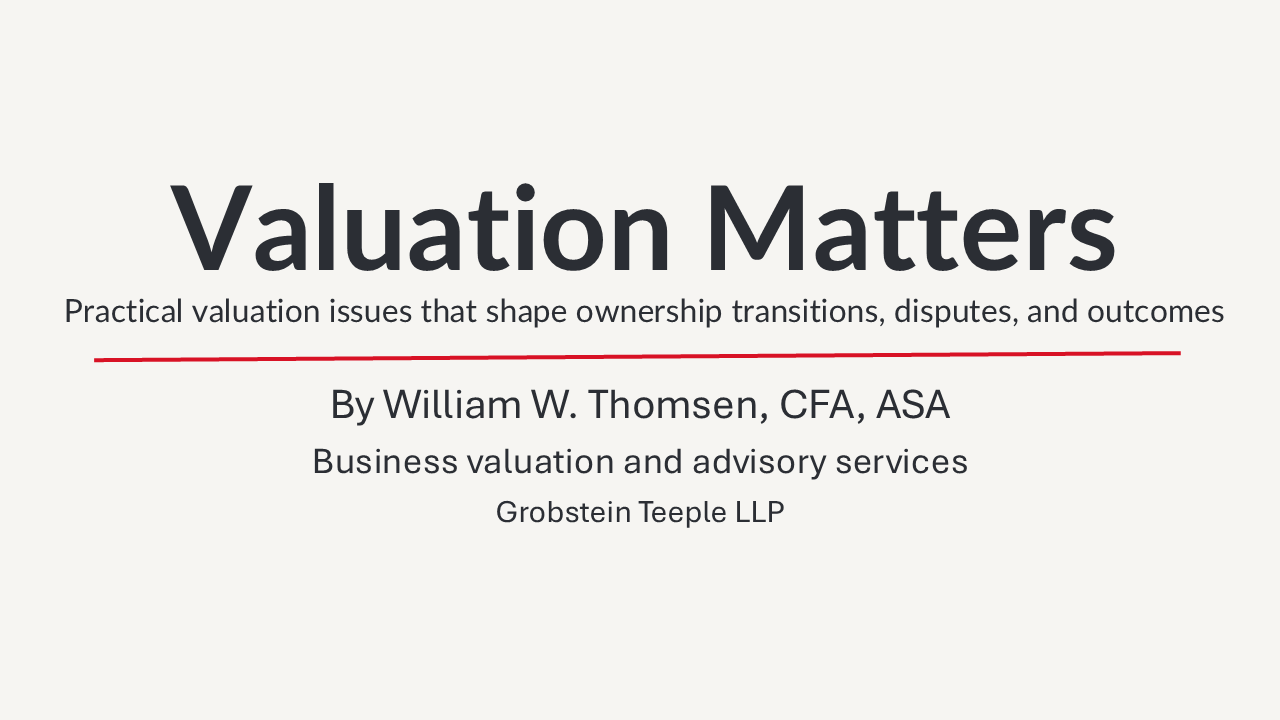Introduction
Valuation questions tend to become most consequential when assumptions are tested by transactions, scrutiny, or changing circumstances.
This issue focuses on what happens when those assumptions meet reality—how governance gaps, financial readiness, and structural choices affect not just valuation conclusions, but negotiations, deal terms, and ultimate outcomes.
Context & Observations

Bridging the “Haves vs. Have-Nots” Divide in Emerging-Company M&A
In today’s M&A market, the gap between the “haves” and “have-nots” is widening.
The “haves” are companies with strong accounting, sound controls, and advisors who can translate performance into a credible valuation story. The “have-nots” are often promising, fast-growing businesses whose accounting systems haven’t matured to meet investor expectations.
That divide often determines who attracts capital, who commands premium valuations—and who struggles to close deals.
The article below underscores a key point: for emerging and middle-market companies, accounting quality is an extremely critical factor in M&A success. Buyers increasingly expect financial statements that are accurate, consistent, transparent, and ready for diligence from day one.
Why This Matters
Investors today scrutinize not just how much a company earns, but how those earnings are built.
They seek sustainable, repeatable, and supportable performance—earnings that can be defended under diligence and projected with confidence.
Sellers who can demonstrate that clarity earn stronger valuations and faster closings; those who can’t often face lower offers, delays, or failed transactions.
For valuation professionals, this is an opportunity to turn financial readiness into measurable deal value and show how accounting sophistication reduces uncertainty for all parties.
Pre-Sale Accounting Readiness
The article highlights that pre-sale accounting preparation is no longer optional—it’s a value lever.
Key steps that separate the “haves” from the “have-nots” include: * Quality of Earnings (QoE) review to normalize results and isolate recurring EBITDA. * Normalizing owner compensation and related-party items to enhance transparency. * Consistent accounting policies that minimize perceived risk. * Anticipating diligence questions—customer concentration, working capital swings, or contingent liabilities.
These steps don’t just tidy the books—they create a valuation narrative that inspires confidence and strengthens negotiating leverage.
Valuation and Deal Terms
Clean, defensible earnings justify higher multiples and fewer buyer protections. Weak documentation or inconsistent accounting can lead to: * Larger holdbacks and earn-outs * Longer diligence timelines * Greater scrutiny in representations and warranties
Sound accounting directly influences pricing, deal structure, and closing certainty.
Implications for Advisors
Valuation is as much about trust as it is about numbers.
Readiness reviews help clients see where they stand, prepare for buyer questions, and negotiate with confidence.
Attorneys and deal advisors should ensure that the terms of the purchase agreement—such as working capital targets and earn-outs—reflect the realities uncovered in the pre-sale accounting review.

How to Use a Valuation to Actually Increase Value
We often treat a valuation as a “number for the file.” But as the article below reminds us, value ultimately isn’t about past earnings—it’s about the quality, consistency, and transferability of future earnings.
Buyers pay for what they believe will continue. That’s why value drivers like customer concentration, key-person risk, replicable processes, recurring revenue, growth potential, and actual, monetizable IP often matter a whole lot more than last year’s EBITDA.
Where many business owners, attorneys, accountants, and advisors miss an opportunity is in how they use their valuation professional.
A seasoned valuer can do far more than issue a report. They can help you understand the story behind the number—and what to do with it.
A few examples:
• Customer concentration: If 60% of revenue comes from one account, a valuer won’t just quantify the risk—they can show how even modest diversification could materially lift value and reduce discount rates.
• Key-person dependence: If an owner is "chief of everything," a good valuer can illustrate how building a management bench or documenting processes makes the business more “transferable”—which buyers reward with higher multiples.
• Margins and scalability: If margins are solid but growth is stalled, a valuer can model scenarios: new product lines, pricing adjustments, or capex investments, showing which moves actually improve value and which don’t.
• Buy-sell or dispute situations: In shareholder matters, a valuer can help attorneys and accountants understand not just “the number,” but the assumptions, sensitivities, and negotiation levers behind it.
• Exit readiness: Many owners wait until they want to sell to think about value. A seasoned valuer can provide a 6- to 24-month roadmap: what to fix, where to invest, what to document, and how to present the business so buyers see lower risk and higher upside.
The key: a valuation is not just a compliance exercise. It can be a diagnostic tool that reveals what’s helping—or hurting—value and how to improve it.
Users of valuation reports can benefit by asking:
- What’s driving value up or down?
- Which risks can be mitigated?
- What would increase value before a sale, buyout, investment, or dispute resolution?
- How do different scenarios change value and negotiation positions?
When you engage your valuer this way, the report becomes the start—not the finish.
A skilled valuation professional doesn’t just deliver a number. They help you understand where value comes from, how to strengthen it, and how to use that insight as the key to making winning strategic, legal, and financial decisions.
Practice Notes

Dusty but Dangerous: the Outdated Buy-Sell Agreement
Somewhere in your office, a buy-sell agreement is sitting untouched — drafted years ago, signed when relationships were smooth, and then filed away.
That’s common. It’s also risky.
Buy-sell agreements are not static documents. As businesses evolve, ownership changes, and tax rules shift, agreements that once made sense can quietly become misaligned with reality. When a triggering event occurs — retirement, disability, death, divorce, or a forced exit — that outdated document suddenly governs a very real and very consequential transaction.
Here’s how to make sure yours still works.
What a Sound Buy-Sell Agreement Should Include
- Clearly defined trigger events (death, disability, retirement, termination, divorce, bankruptcy — explicitly addressed).
- A valuation mechanism that functions in practice:
- Fixed price: simple, but typically outdated almost immediately.
- Formula: more flexible, but often fails to keep pace with business complexity or market change.
- Appraisal process: generally the most durable and equitable approach, particularly for growing or multi-owner businesses.
- Realistic funding provisions (insurance, promissory notes, timing of payments).
- Coordination with tax and estate planning considerations, especially in family-owned enterprises.
- Explicit shareholder agreements drafted while relationships are stable.
Indicators That a Review Is Overdue
- The agreement relies on a fixed price or a formula that has not been updated in many years.
- The company’s size, profitability, capital structure, or risk profile has changed materially.
- Ownership has changed.
- Tax or estate planning rules have shifted.
- Buyout funding assumptions are optimistic or unclear.
- Shareholder personal circumstances have changed.
Any one of these is reason enough to revisit the document.
Practical Next Steps
- Retrieve the agreement.
- Review the trigger and pricing provisions with today’s business in mind.
- Involve legal, valuation, and tax advisors.
- Evaluate whether the company could realistically fund a buyout under current terms.
- Update the agreement and establish a regular review cycle — typically every two to three years, or after major business events.
Final Thoughts
A buy-sell agreement is a business-continuity instrument, not a one-time legal exercise. It should evolve as the business does.
Review it proactively. Update it deliberately. Doing so now is far easier than discovering its shortcomings when a triggering event leaves no room for adjustment.
In Closing

If you found this issue useful, feel free to forward it to a colleague who may encounter similar valuation questions.
If a valuation, transaction, or dispute-related issue would be useful to discuss—or if there’s a topic you’d like to see addressed in a future issue—I’m always glad to compare notes.
-- WT
William W. Thomsen, CFA, ASA
Business valuation and advisory services
Grobstein Teeple, LLP

Commentary
The Drama Discount: How Dysfunction, Deadlock, and Friction Can Impact Value
A recent New York appellate decision, Marshall v. Marshall (2025), offers an important reminder for valuation analysts: marketability isn’t determined solely by liquidity data or theoretical models. It is shaped by the lived realities a hypothetical buyer would inherit.
In the case, the court affirmed a 15% DLOM for interests in several Manhattan real-estate LLCs, not because of conventional illiquidity, but because a buyer would be purchasing into years of hostile litigation, no exit or transfer framework, and owners unwilling to cooperate. The court’s view was simple: a buyer must price the chaos they are stepping into.
While this opinion applied to a specific situation, the core insight applies broadly across jurisdictions and standards of value: marketability is highly sensitive to governance dysfunction, owner disputes, and structural impasses.
Actual frictions matter more than theoretical ones—and help explain why discounts are observed in the marketplace.
And, as businesses just happen to be made of people, personal dynamics and organizational design can impact value just as much as cash flows, discount rates, or capital structures.
For practitioners, the case reinforces a fundamental valuation truth: we don’t value businesses in a vacuum. We often value the conditions under which a buyer must operate—and, depending on the situation and interest being valued, those conditions might end up warranting a valuation discount.
Can you think of situations where internal dysfunction or governance failures materially affected the value—or viability—of an otherwise attractive business interest?
bvresources.com